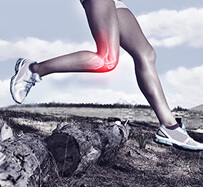Runner's Knee Treatment in Westwood, MA

Whether you call it runner’s knee, patellofemoral pain syndrome (frontal knee pain), or iliotibial band friction syndrome (pain in side of knee) – it hurts. And not just for runners.
Runner’s knee can account for up to 40% of the knee complaints in sports medicine clinics where patients are commonly instructed to rest, ice, wrap, elevate, and stretch their knee while taking NSAIDs. In severe cases, surgeons remove damaged cartilage. These aren’t always effective long-term solutions, especially as our knees begin to age.
Regenerative medicine specialists have been performing stem cell therapies on the knees of professional athletes for over 20 years. When live stem cells are injected into damaged ligament tissue, they may be able to stimulate your cells to repair and restore your torn ACL, relieving or reducing pain while promoting the growth of new cells in your knee tissue.
What are the symptoms of runner’s knee?
Pain. Lots of it. You know you have runner’s knee when you feel:
- pain in front of your kneecap, though it could be around or behind it
- pain when you bend your knee to walk, squat, kneel, run, or even get up from a chair
- pain that worsens when you walk downstairs or downhill
- pain with swelling, popping or grinding around your kneecap
What causes runner’s knee?
There are so many ways to put our knees through the wear and tear required to cause this common debilitating condition. Here are the most common:
- direct hit: from a fall or blow
- overuse: high-stress exercises, repetitive lunges, and too much running
- bone malalignment: a kneecap that’s slipped out of position can cause painful pressure
- foot conditions: hypermobile feet, fallen arches, or overpronation can lead to knee pain
- weak unbalanced thigh muscles: weak quadriceps fail to keep kneecap in place
- chondromalacia patella: cartilage under your kneecap breaks down
How can stem cells treat runner’s knee?
For over 20 years clinical trials have been demonstrating promising results of stem cell injections as an efficacious runner’s knee tissue treatment. After a thorough physical knee exam, and maybe an X-ray, your provider will inject 5 million live-nucleated cells into your injured knee tissue using ultrasound technology as a guide.
Our live-nucleated cells will migrate to your damaged cells and release growth factors, cytokines & chemokines into your blood. These substances may then:
- activate T-cells to secrete proteins
- open your blood vessels and form new ones
- move cells out of your blood vessels and into the tissues surrounding them
- stimulate your cells to regenerate your tissue
- inhibit your inflammation
- regulate your immune system
How quickly or potently this regeneration occurs in your knee depends on your age, genetics, injury severity, general health, and other environmental factors.
Where do these live stem cells come from?
We source stem cells only from the umbilical cord blood of healthy newborns. If a pregnant woman is not planning to keep her unborn child’s umbilical cord, she may choose to donate it. She’ll be asked to sign an informed consent form, followed by medical and social history reviews, as well as a blood test.
After a new mother meets all donor eligibility requirements and safely delivers her baby, the umbilical cord blood is collected in a sterile cord blood collection pouch and sent to a lab. The cord blood is processed within 48 hours using proprietary methods. A sample of the finished product is tested by an independent third-party lab for sterility. The umbilical cord stem cells are distributed once the lab reports have passed mandatory regulatory requirements.
Are umbilical cord stem cells FDA approved?
The FDA recently confirmed there is only one registered and approved stem cell product on the market: umbilical cord blood-derived hematopoietic progenitor cells (blood forming stem cells) used for certain indications. While there is enormous promise in stem cell therapies, and thousands of ongoing experiments trying to establish efficacy, stem cell treatments do not yet meet the FDA’s scientific approval standard.
Practitioners tapping into this enormous promise of stem cells for any therapeutic use must exercise their professional judgment and expertise. We urge anyone embarking on the use of stem cell therapies to consult the national health data bases to evaluate current clinical trial information, and the FDA’s website on human tissue to get its current therapy evaluations.
In 2018 the FDA’s commissioner and research director reported that the agency will be incorporating some “new concepts for how small investigators and firms can seek and meet the approval standard for products through efficient expedited pathways.” You can keep up with latest developments on the FDA’s website.
What are the side effects of stem cell injections?
As with any injection procedure, there is a small risk of bacterial infection (not associated with the product) and nerve damage. If you experience severe pain, bleeding, or swelling at your injection site, or experience symptoms like fever, nausea, dizziness, or vomiting, seek emergency medical care right away.
When can I expect to feel results?
People heal at different rates. Your recovery time depends on your age, genetics, damage severity, health and environmental factors, as well your dedication to post-treatment care.
Give your cells time to regenerate by taking it easy on your knee. Temporarily switch to a new form of exercise that won't hurt your joint (e.g., joggers, consider swimming laps for a couple of months instead of jogging).
Your body’s regenerative powers work slowly and steadily – observe your unique pace and respect it. If you return to your usual workouts before your tissues have had a chance to regenerate you could damage your knee permanently. You can return to your usual robust routine after your doctor informs you it’s okay to do so, generally after:
- your knee is fully bending and straightening without pain
- you can walk, jog, sprint, or jump pain free
- your treated knee is just as strong as your uninjured knee.
Reserve your appointment today
Runner’s knee can cause intense pain, limiting your ability to walk, work, and enjoy the best things in life. Stem cell injection therapy may be able to repair your knee tissue, reduce or eliminate your pain, and improve your quality of life. To speak with a stem cell injection specialist in Westwood today, call (617) 315-2908 or contact Dr. Sherif Algendy online.
Boston Stem Cell and Regenerative Medicine Institute
Address
22 Pleasant StSuite 2N
Bridgewater, MA 02379
(617) 315-2908
Hours
Mon:
By Appointment Only
5pm or later
Tue:
By Appointment Only
5pm or later
Wed:
By Appointment Only
5pm or later
Thu:
By Appointment Only
Stem Cell treatments/services
Fri:
By Appointment Only
Stem Cell treatments/services
Sat:
By Appointment Only
Stem Cell treatments/services
Sun:
Closed





